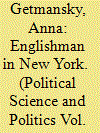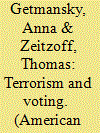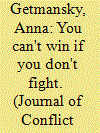|
|
|
Sort Order |
|
|
|
Items / Page
|
|
|
|
|
|
|
| Srl | Item |
| 1 |
ID:
167349


|
|
|
| 2 |
ID:
189010


|
|
|
|
|
| Summary/Abstract |
Does war affect support for incumbent leaders and parties? The literature is divided with studies reporting negative, positive, or null-effects. Many studies analyze the consequences of foreign intervention, and less is known about the political costs of wars fought close to home. Building on theories of retrospective voting, we theorize that wars inform voters about leader’s competence, and in turn affect mass attitudes and behaviors. Leveraging the unexpected onset of the 1973 Yom Kippur war which interrupted an ongoing Israeli public opinion poll, and voting records from four national elections linked with Israeli military fatality data, we demonstrate that despite the ultimate military victory, the war and its casualties reduced support for incumbent parties and leaders, and increased support for the opposition. By moving beyond foreign interventions, we provide strong evidence that wars over a country’s core territory can be politically costly for incumbent leaders and parties.
|
|
|
|
|
|
|
|
|
|
|
|
|
|
|
|
| 3 |
ID:
160535


|
|
|
|
|
| Summary/Abstract |
What factors influence attitudes towards refugees? Do negative attitudes towards refugees also influence attitudes towards conflict in the host countries? Previous studies suggest that an influx of refugees, and locals’ reaction to them, may destabilize receiving countries and lead to conflict. In particular, actual or perceived negative effects of refugees’ presence, such as increased economic competition with the locals, disruption of ethnic balance in the host country, and arrival of people with ties to rebel groups may lead to an increased likelihood of civil conflict in countries that receive refugees. These effects can lead to instability by changing the locals’ incentives and opportunities of engaging in violence. Indeed, some studies find a positive correlation at the cross-national level between influx of refugees and conflict in receiving countries. We contribute to this literature by experimentally manipulating information about the externalities of hosting refugees. We conducted a survey-experiment in the summer of 2014 in Turkey, a country that hosts the largest number of Syrian refugees. We examine how different messages about the possible effects of hosting refugees – increased economic burden, disruption of ethnic balance, and ties with rebels, as well as a positive message of saving innocent women and children – affect locals’ perceptions of the refugees and their attitudes towards the Turkish-Kurdish peace process. We find that some messages cause locals, especially majority non-Kurds, to hold more negative views of the refugees, and in some cases to view them as a threat. Generally speaking, this information does not affect support for the peace process within Turkey. Rather, fundamental factors, such as partisanship, and previous exposure to conflict are better predictors of attitudes towards peace.
|
|
|
|
|
|
|
|
|
|
|
|
|
|
|
|
| 4 |
ID:
158229


|
|
|
|
|
| Summary/Abstract |
How does terrorism affect land control in intrastate conflicts? This article explores this question in the case of the Israeli–Palestinian conflict during the Second Intifada (2000–2005), and shows that Palestinian attacks led to an expansion of Israeli outposts in the disputed territories of the West Bank. Following suicide attacks, there is an increase in outposts in home districts of the perpetrators. The number of outposts also increases following deadly attacks against Israelis in West Bank districts where these attacks take place. These results suggest that Israeli settlers use outpost expansion as retaliation against Palestinian communities they perceive to be involved in violence, and this shifts territorial control against Palestinians.
|
|
|
|
|
|
|
|
|
|
|
|
|
|
|
|
| 5 |
ID:
133946


|
|
|
|
|
| Publication |
2014.
|
| Summary/Abstract |
How does the threat of becoming a victim of terrorism affect voting behavior? Localities in southern Israel have been exposed to rocket attacks from the Gaza Strip since 2001. Relying on variation across time and space in the range of rockets, we identify the effect of this threat on voting in Israeli elections. We first show that the evolution of the rockets' range leads to exogenous variation in the threat of terrorism. We then compare voting in national elections within and outside the rockets' range. Our results suggest that the right-wing vote share is 2 to 6 percentage points higher in localities that are within the range-a substantively significant effect. Unlike previous studies that explore the role of actual exposure to terrorism on political preferences and behavior, we show that the mere threat of an attack affects voting.
|
|
|
|
|
|
|
|
|
|
|
|
|
|
|
|
| 6 |
ID:
157356


|
|
|
|
|
| Summary/Abstract |
How and on what grounds do international organizations allocate aid to their member states? I answer this question in the context of the International Atomic Energy Agency (IAEA). I find that political considerations affect the likelihood of receiving aid, as well as the amount of aid that countries receive. In particular, membership in the IAEA board of governors and the acceptance of tougher IAEA inspections increase the likelihood of IAEA assistance. These factors also increase the amounts of assistance, but only for countries with divergent policy preferences from those of the United States. In consequence, those states that receive IAEA assistance are not always those most in need of it. My findings track with theories that countries receive foreign aid in exchange for cooperation and concessions to donors.
|
|
|
|
|
|
|
|
|
|
|
|
|
|
|
|
| 7 |
ID:
121850


|
|
|
|
|
| Publication |
2013.
|
| Summary/Abstract |
What effect, if any, does democracy have on outcomes of counterinsurgency wars? Previous studies have provided inconclusive answers mainly because of the challenges involved in testing the question empirically: First, insurgencies are not accidental and the anticipated outcomes also affect whether they break out in the first place. Second, regimes are non-random and their determinants can also affect insurgency incidence and its outcomes. Moreover, different aspects of democracy can have opposite effects on the government's chances of winning. I address these challenges by conducting a critical test to distinguish between different causal mechanisms. I find that domestic institutions that are associated with public goods provision make insurgency onsets less likely. I also show that once we control for this selection effect, domestic political institutions do not influence insurgency outcomes.
|
|
|
|
|
|
|
|
|
|
|
|
|
|
|
|
|
|
|
|
|